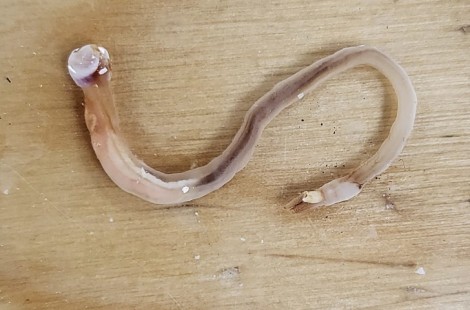
Wood-munching marine worms famed for devouring Columbus’s fleet, Tudor wrecks and sunken Viking longships could prove a revolutionary source of sustainable, nutrient-rich food for humans, according to a Murray Edwards College scientist.
Shipworms, whose insatiable appetite left Christopher Columbus temporarily stranded, shipless, in the Caribbean, have a remarkable ability to convert wood immersed in salt water into highly nutritious, vitamin-packed protein, suitable for use as an eco-friendly white fish substitute in processed foods such as fishcakes and nuggets.
In a report published today [20 November 2023] in the Nature journal npj Sustainable Agriculture, Dr David Willer, a Fellow of Murray Edwards College, Cambridge, sets out the world’s first system of farming the long white saltwater worms, which he and his fellow researcher have renamed ‘Naked Clams’. Over millennia, this branch of the clam family have shrunk their shell almost to nothing, meaning that they grow exceptionally quickly and dwarf their full shell-toting cousins. With little energy wasted on shell construction, Naked Clams are the world’s fastest-growing bivalve, reaching 30cm long in just six months and extending at their longest to two metres.
Under the pioneering aquaculture system devised and trialled by the researchers, Naked Clams are fed on waste wood such as bark chips from the forestry industry, packed into large chipboard-like panels in land-based tanks filled with salt water. The system is fully enclosed, ensuring water quality remains perfect and eliminating the food safety concerns often associated with mussel and oyster farming. The hungry creatures bore their way through the organic matter, just as they once consumed warships or wooden wharves and jetties, and can then be easily harvested from the panels once they reach a suitable size.
Dr Willer, Henslow Research Fellow at the University of Cambridge’s Department of Zoology and first author of the new study, said the Naked Clams acted as a ‘biochemical factory’, with distinctive gut bacteria able to break down wood and transform it into protein. He said: ‘Their meat tastes like oysters, with a flavour varying slightly according to the wood they have been fed on. It’s rich in Vitamin B12 - essential for building red blood cells, nerve function and DNA synthesis – and beneficial mono-unsaturated fats like those found in olive oil.’
In the Philippines, wild shipworms are eaten raw as a delicacy or battered and fried like calamari, but their nutritional qualities have largely gone unrecognised elsewhere in the world – possibly due to their somewhat unprepossessing looks (they have no central nervous system and no facial features). Under Dr Willer’s proposed scheme, the squeamish can enjoy them processed into a replacement for white fish or even meat. ‘They have higher nutritional value and a fraction of the associated environmental impact,’ he said. They’re a bit like Quorn – they're a very adaptable protein source that can be used in everything from sausage to mince. Through farming, we can even add algae to the water in the tanks, fortifying them with extra Omega 3. They’re very, very flexible organisms.’
Naked Clam aquaculture has never been attempted before, added Dr Willer, who collaborated on the research with Dr Reuben Shipway at the University of Plymouth’s School of Biological & Marine Sciences. But as awareness grows of the environmental cost of global meat and fish production, and consumers increasingly demand sustainable ingredients, the hunt for alternative food sources has become ever more urgent. ‘We’re growing Naked Clams using wood that would otherwise go to landfill or be recycled,’ Dr Willer said. ‘A big part of the appeal of this project is that production can be net zero.
Prior to this project, shipworms had remained almost entirely under the global research radar. The creatures that, Columbus wrote, destroyed his fleet because of 'the havoc which the worm had wrought’, and which still cause billions of dollars of damage every year, are studied by just a handful of academics worldwide. When Dr Willer published his first research paper on shipworms in August 2020, his supervisor told him it was ‘ridiculous’.
The researchers’ rebranding of the worms as Naked Clams may help raise their profile. ‘The Trademark Office enjoyed that,’ Dr Willer said.
The research is a collaboration between the Universities of Cambridge and Plymouth, and has attracted funding from sources including The Fishmongers’ Company, British Ecological Society, Cambridge Philosophical Society, Seale-Hayne Trust, and the Biotechnology and Biological Sciences Research Council (BBSRC).
The team is now trialling different types of waste wood and algal feed in their system to optimise the growth, taste and nutritional profile of the Naked Clams – and is working with Cambridge Enterprise to scale-up and commercialise the system.
Notes for editors:
Report link: Naked Clams to open a new sector in sustainable nutritious food production | npj Sustainable Agriculture (nature.com)
Reference:
Willer, D.F. et al: ‘Naked Clams to open a new sector in sustainable nutritious food production.’ Sustainable Agriculture, Nov 23. DOI: 10.1038/s44264-023-00004-y
For more information:
Please contact Dr David Willer on +44 (0) 7507 723137 or dw460@cam.ac.uk
or
Lucy Ward, Head of Communications, Murray Edwards College, Cambridge, on +44 (0) 7788 567707 or lucy.ward@murrayedwards.cam.ac.uk